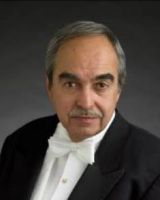
Porco Takes the CSO on a New Journey
Ralph Vaughan Williams is best known to symphony audiences for two very popular works, “Fantasia on a Theme by Thomas Tallis” and “Fantasia on Greensleeves.”

May Festival Chorus director Robert Porco gave the Cincinnati Symphony audience a new perspective on the English composer with the CSO premiere of his Symphony No. 1, “A Sea Symphony,” Sunday afternoon at Music Hall.
It was an event of “oceanic” proportions, with the 130-plus May Festival Chorus, guest artists Brett Polegato, tenor, and soprano Kelley Nassief and the full strength CSO -- over 90 players, including two harps, organ and four percussionists – in an hour’s worth of watery tributes, reflections and metaphors based on poems by Walt Whitman.
Furthering the aquatic theme were excerpts from Handel’s “Water Music,” written for mere outings on the River Thames by King George I.
They made a fine contrast, with a reduced CSO (about 30 players), plus Heather MacPhail on harpsichord, for the Handel. Heard were Suite III in G Major and II in D Major, given shapely, nuanced readings, with string vibrato reinstated after Sir Roger Norrington’s period performance of Mozart last month (there was even a waltz-like lilt to the lovely Lentement of Suite II). Joan Voorhees gave special charm to the several movements where the piccolo is prominent.
Following intermission came the Vaughan Williams, which despite having the characteristic four-movement form, is more cantata than symphony, with full choral participation throughout. The first movement, “A Song for All Seas, All Ships,” was announced by a bold, brass fanfare and a dramatic “Behold the Sea!” by the May Festival Chorus, a stirring beginning if there ever was one. Polegato displayed a heroic, but not heavy voice that infused the text with energy as he praised the “unnamed heroes in the ships,” while Nassief’s lovely soprano added poignancy to the chorus’ tribute to those “who went down doing their duty.”
The second movement, “On the Beach at Night Alone,” was a beauty, with Polegato in a sober, sometimes mono-tonal meditation against low-lying timbres in the CSO that swelled to a climax before returning whence it came.
Most programmatic of the three was “The Waves,” a scherzo where the chorus and CSO emulated the sea’s turbulence, with splashes of spray by piccolo and snare drum. It became march-like and celebratory at one point and the wake of the ship was vividly portrayed by the chorus alone and in full voice at the end.
The final movement, itself almost a half-hour long, is called “The Explorers,” but it is a journey of the soul. There was questing music for the men’s voices as “down from the gardens of Asia descending” Adam and Eve and their “myriad progeny” appeared, “wandering, yearning, curious.” The sopranos asked softly, a capella, “Wherefore unsatisfied soul?”
There were extended passages for Polegato and Nassief, with solos by associate concertmaster Rebecca Culnan and principal violist Victor de Almeida, leading to an anticipatory chord before “O Thou transcendent,” where the soul takes courage to venture forward. The music became bright and animated on “Away O Soul! Hoist instantly the anchor!” led by the vocal soloists as the soul headed into a region “where mariner has not yet dared to go.” The ending was touchingly eloquent, violins and basses alternating softly before a, final, unresolved chord in the basses.
Porco invariably leads concerts to remember, both at the CSO and the May Festival, and this was no exception. He conducted with authority and insight, expanded the CSO audience’s horizons in the process, and earned an enthusiastic ovation in return.